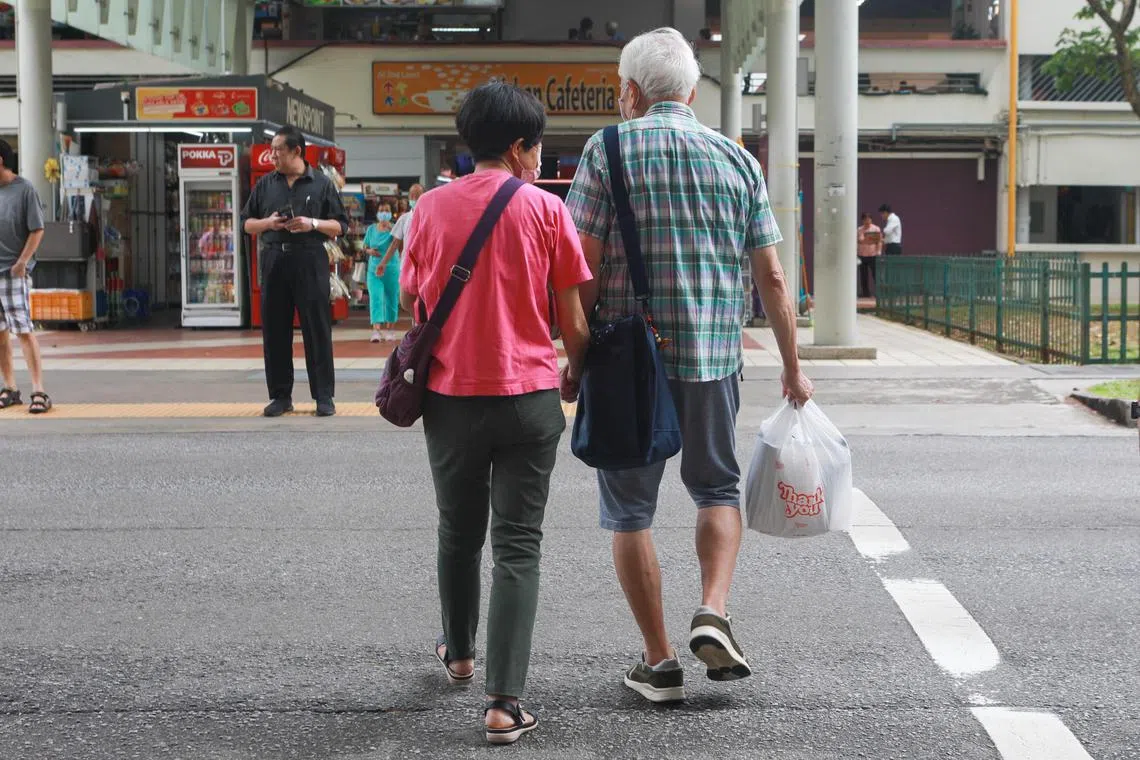From The Gallery
Budget debate: A tale of two Singapores, or a continuum of support?
Sign up now: Get ST's newsletters delivered to your inbox

The theme of seniors and retirement adequacy was one of the topics that received ample airing during the Parliament session on Feb 22, 2023.
ST PHOTO: RYAN CHIONG
Amid the interminable stream of 27 MPs who spoke on the Budget on Wednesday, some turns of phrase stuck in my mind.
The first, “two Singapores”, came from Leader of the Opposition Pritam Singh,
The second, on pain, came from Mr Sitoh Yih Pin (Potong Pasir).
I recalled the metaphors of analgesics and anaesthetics that swirled around his fiery exchange with Workers’ Party MPs Leon Perera and Jamus Lim in November 2022, when the three men debated the GST hike.
On Wednesday, Mr Sitoh said that while the Government is committed to relieving citizens’ pain, the aim of the opposition is to convince Singaporeans that the glass is getting emptier and the pain points they face, intractable.
“They want you to change your doctor, but we have to ask ourselves, ‘Will this so-called new doctor have better solutions and cures, or worse?’” he asked.
Political sparring aside, the substantive issues raised on Wednesday covered virtually every life stage.
A few themes – seniors and retirement adequacy, business costs, housing, parenthood, education and training – received ample airing.
On retirement adequacy, Mr Singh asked if the Government had considered allocating more to the Central Provident Fund Special Account which earns more interest and, in his view, would serve Singaporeans’ retirement needs better.
Ms Ng Ling Ling (Ang Mo Kio GRC) asked about support for elderly residents who are asset-rich but cash-poor.
Mr Saktiandi Supaat (Bishan-Toa Payoh GRC) asked if the Government would consider allowing earlier drawdown of retirement funds for certain purposes, such as defraying medical bills for pre-existing medical conditions.
Ms Jessica Tan (East Coast GRC) sought better eldercare support, often a huge strain on families’ expenses; and spoke up for better quality of seniors’ jobs, not just employment numbers.
On parenthood, she, like Messrs Liang Eng Hwa (Bukit Panjang), Dennis Tan (Hougang) and Louis Chua (Sengkang GRC), had mixed feelings about the change to the Working Mother’s Child Relief (WMCR)
To maximise benefits to both lower- and middle-income working mothers, Ms Hany Soh (Marsiling-Yew Tee GRC) suggested retaining both the fixed dollar and percentage relief, with whichever is higher to apply.
Mr Chua suggested giving a motherhood tax rebate to lower-income working mothers instead. If the tax rebates granted exceed the tax payable, tax credits can be paid out in cash to ensure the reliefs are not lost, he said.
Added Mr Tan: “Regardless of the Government’s intention, I think it sends a discouraging signal to affected working mothers and takes the shine off the originally intended symbolism of this scheme.”
Speaking of intended symbolism, is symbolism enough? How effective was the WMCR to begin with? One hopes there will be further clarification on this issue.
The billion-dollar tuition industry here came in for special mention by Mr Christopher de Souza (Holland-Bukit Timah GRC), who proposed to “right-size” the school syllabus to minimise stress and the need for tuition.
Mr Xie Yao Quan (Jurong GRC) also mentioned tuition in the context of household expenditure, which today is seen primarily through the lens of income bands.
But, he said, it would be useful to also study household expenditure by household archetypes. One archetype would be a “sandwiched” sub-segment which still regards tuition as necessary.
“In turn, we can form a better, more nuanced understanding of particular drivers of cost-of-living pressures for this particular sub-segment,” he said.
Here, I’m reminded of a 2021 study, which stirred public debate when it stated that a family of four in Singapore needs over $6,000 a month to afford a basic standard of living.
The Finance Ministry had pointed out then that the researchers included discretionary spending items such as private enrichment classes and overseas holidays.
So what truly are the baseline expectations and aspirations of ordinary Singaporeans, and how can these be adequately captured? Mr Xie’s suggestion offers food for thought.
On housing, Mr Zhulkarnain Abdul Rahim (Chua Chu Kang GRC) queried on the feasibility of a capital gains tax for HDB flats that have been sold at a huge profit.
If the profit is so excessive and disproportionate to the fair valuation or initial purchase price, then a portion of the profit could be considered as a windfall, he said.
Ms Tin Pei Ling (MacPherson) and Mr Darryl David (Ang Mo Kio GRC) also asked about support for those who wish to live near their elderly parents, who may live in mature estates where flat prices may be high.
We’re barely halfway through, with a clutch of labour MPs due to speak in Thursday’s Parliament session. Will the issue of unemployment support come up?
In any case, one gets a better sense of the areas of concern that have shaken out from the Valentine’s Day Budget, and which may be addressed in Deputy Prime Minister and Finance Minister Lawrence Wong’s round-up speech on Friday.



